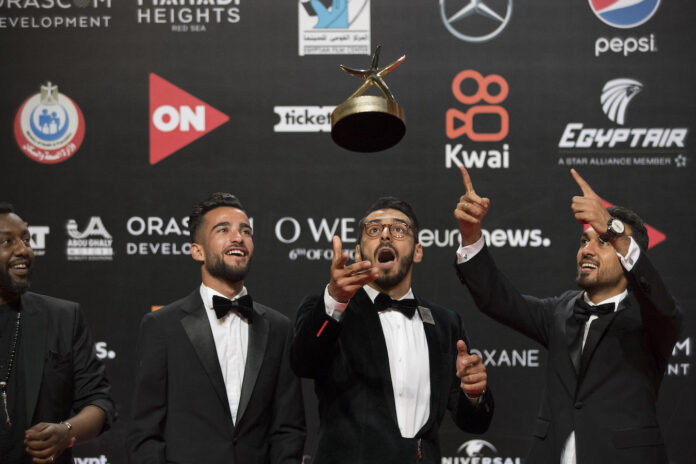DUBAI: Nearly 10 years ago, Egyptian filmmaker Ali El-Arabi, the award-winning documentarian behind “Captains of Zaatari,” which hits Netflix this month, made a promise. He was in the Zaatari refugee camp in Jordan, the largest temporary settlement of displaced Syrians in the world, and a teenaged boy he had just met named Fawzi Qatleesh asked if he could speak his truth to the camera.
“On the first day I arrived, he asked me, ‘Ali, can you film me? I want to say something to the people outside of this camp.’ The second he started to talk, I said to myself, ‘This boy is my hero,'” El-Arabi tells Arab News.
Qatleesh had dreams. He wanted to become a professional footballer. More importantly, he wanted the people outside those fences to know the truth of the refugee experience. He didn’t want pity, he told El-Arabi, he only wanted opportunity.
As the film hits Netflix this month in the Middle East, El-Arabi is overjoyed. Finally, after seven years of filming and a years-long global festival tour, his promise is fulfilled.
“I lost a lot of money, to be honest, because I refused to sell the film to a smaller platform that might limit its reach. That was for Fawzi — because of that promise I made him on the first day. I told him to say what was in his heart, and I would tell everyone in the world his story. That has been my mission ever since,” says El-Arabi.
El-Arabi knew what it felt like to have a message that people needed to hear. He was himself once an athlete, a dedicated and successful martial artist, even winning Egypt’s national kickboxing championship. During the Egyptian revolution, however, El-Arabi abandoned any future he might have in sport, instead turning towards filmmaking.
“Captains of Zaatari” is on Netflix. (Supplied)
“I started to feel I had something to say, but I couldn’t say it with my voice,” he says. “I realized filmmaking was the way I could say it. I started making small documentaries about what was happening and screening them in the street. One day, the police came and I took my film and I ran. That made me realize the power of what I could say with a camera.”
El-Arabi left Egypt, partnering with the ZDF TV channel to film documentaries in war zones including Iraq, Syria, Kurdistan and Afghanistan. War reporting, however, was unfulfilling, as it so often stripped away the humanity of those caught in its horrors.
“Refugees and the victims in the war were all just numbers. It was the news, and the news just wanted statistics,” El-Arabi says. “I couldn’t process it that way. These were people, and I knew there was more going on than the news could report.”
After meeting Qatleesh and his friend Mahmoud Dagher — the two boys he would ultimately follow from the refugee camp in Jordan all the way to an elite soccer program in the Gulf — El-Arabi filmed them for seven years before whittling their story down to a scant 75 minutes, resulting in a story that showed their incredible journey while also refusing to gloss over the realities of refugee life.
Nonetheless, the film is bursting with hope, and El-Arabi’s proudest moments have come showing the film not to the outside world, as he originally intended, but to those in similar circumstances to Dagher and Qatleesh when he first found them.
“We screened it at a refugee camp in Lebanon, and person after person came up to me to tell me that, for the first time, they could think about the future. They said the film showed them that they could not only have dreams, they could achieve them. I will never forget that,” El-Arabi says.
Since its limited release in 2021, the film has already transformed the lives of both young men whose story it follows.
“They’re stars now. They feel it. Even some football clubs have watched the film and want to give them opportunities,” El-Arabi says. “The government of Jordan and the leaders in the camps respect them. Children in the camps are looking to them as role models. I speak to them all the time, and it’s wonderful to watch, even though they also feel the pressure from their families that they need to start delivering on their promise as soon as possible, and transforming their situation too.”
A still from El-Arabi’s upcoming project “Ashish’s Journey.” (Supplied)
While he may be done telling their story, El-Arabi has been hard at work over the last few years on another — “Ashish’s Journey” — about the upcoming FIFA World Cup. It is inspired by a man who approached him in Qatar as he filmed “Captains of Zaatari.”
“An Indian man came to me one day and asked if he could take a picture with me. He thought I was a soccer player, and he told me he wanted to send the picture back to his family,” El-Arabi explains. “He told me, ‘I came here to watch the World Cup. But I didn’t have money to come, so I came here to work now, so that I could meet the famous players one day. I thought you were one of them.'”
The more time El-Arabi spent with the man, the more his innocent aspirations intrigued him, leading him to not only film Ashish in Qatar, but to follow him and his family back to India, even adding fictional elements (with Ashish playing himself) inspired by the classic French satirical novella “Candide” to the docu-film.
“He’s actually a very good actor,” El-Arabi says.
While El-Arabi knows that he will finish filming later this year at the World Cup, chronicling Ashish’s adventures during the games, he does not plan to rush the film out in the immediate aftermath of the event.
“I want to savor the material. I don’t want to rush it for a big festival. I love working on this film. I don’t want to kill the process — kill everything I’ve put into this — just to have something done fast,” he says.
El-Arabi has other projects in the works as well. He’s currently producing a film about Algeria and discussing producing an upcoming project with his best friend Mohamed Diab, the director of Marvel’s “Moon Knight.” Closest to his heart, though, is the fiction film he has in the works between Los Angeles and Egypt, inspired by both his own history in boxing and his relationship with his father.
“We’re talking to major international stars (about) it,” he says. “It’s a story that takes a lot from my own experiences with my family, and nearly every time I pitch it to people they cry. One person I work closely with, as soon as I finished, said they had to leave room to call their father.”
While telling Arab stories will remain a key part of El-Arabi’s career moving forward, ultimately what drives him is not capturing his identity — it’s capturing his soul.
“I will tell Arab stories, but I don’t think a lot about telling stories about the Arab world,” he says. “I think about humans. That’s all I’m interested in.”


